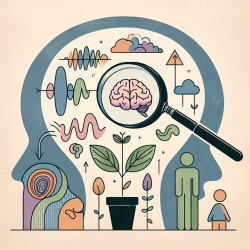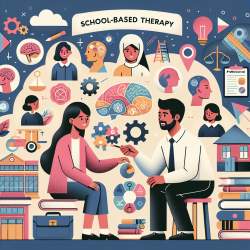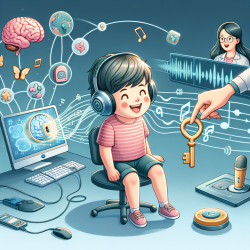Introduction
In the realm of speech-language pathology, understanding the nuances of auditory processing in children with neurological disorders such as epilepsy is crucial. Recent research, specifically the study titled "Nonverbal Dichotic Test in Patients with Epilepsy," sheds light on the auditory processing challenges faced by children with epilepsy. This blog aims to explore these findings and discuss their implications for practitioners seeking to improve therapeutic outcomes.
Understanding the Research
The study conducted by Ortiz et al. (2009) evaluated the performance of children with epilepsy on a nonverbal dichotic test. The research involved 38 children aged 7 to 16 years, all diagnosed with idiopathic epilepsy. These children were divided into two groups: those with partial seizures and those with generalized seizures. The primary objective was to assess whether seizure type affected auditory processing capabilities.
Key Findings
The study revealed that both groups of children with epilepsy exhibited impairments in nonverbal auditory processing when compared to a normal population. Notably, there were no significant differences in performance between children with partial seizures and those with generalized seizures. This suggests that epilepsy, regardless of seizure type, poses a risk for auditory processing disorders.
Implications for Practitioners
For speech-language pathologists and other practitioners, these findings underscore the importance of incorporating auditory processing assessments into the therapeutic framework for children with epilepsy. By understanding the specific auditory challenges these children face, practitioners can tailor interventions to address these deficits effectively.
- Enhanced Assessment: Implementing nonverbal dichotic tests can provide valuable insights into the auditory processing abilities of children with epilepsy, allowing for more precise diagnosis and intervention planning.
- Targeted Interventions: With a clearer understanding of the auditory processing impairments, practitioners can design targeted interventions that focus on improving auditory attention and processing skills.
- Holistic Approach: Considering the potential impact of epilepsy on auditory processing, a holistic approach that integrates auditory training with other therapeutic modalities can enhance overall outcomes.
Encouraging Further Research
While this study provides valuable insights, it also highlights the need for further research. Future studies could explore the influence of factors such as age at seizure onset, seizure frequency, and medication on auditory processing in children with epilepsy. Such research would contribute to a more comprehensive understanding of the condition and inform more effective therapeutic strategies.
Conclusion
The findings from the "Nonverbal Dichotic Test in Patients with Epilepsy" study offer a compelling case for the integration of auditory processing assessments in the management of children with epilepsy. By leveraging these insights, practitioners can enhance their therapeutic approaches, ultimately leading to better outcomes for their young patients.
To read the original research paper, please follow this link: Nonverbal dichotic test in patients with epilepsy.










